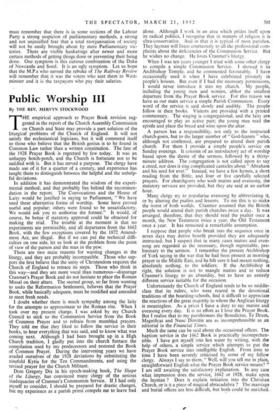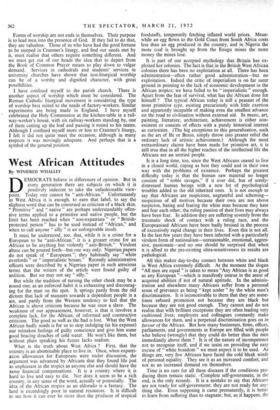Public Worship III
By THE REV. MERVYN STOCKWOOD
THE empirical approach to Prayer Book revision sug- gested in the report of the Church Assembly Commission on Church and State may provide a part solution of the liturgical problems of the Church of England. It will not satisfy the ecclesiastical logicians, but it will commend itself to those who believe that the British genius is to be found in Common Law rather than a written constitution. The fate of the 1928 Prayer Book is regretted by few today. It was an unhappy hotch-potch, and the Church is fortunate not to be saddled with it. But it has served a purpose. The clergy have made use of it for a quarter of a century, and experience has taught them to distinguish between the helpful and the unhelp- ful deviations.
In addition it has demonstrated the wisdom of the experi- mental method; and that probably lies behind the recommen- dation in the report. The Convocations and the House of Laity would be justified in saying to Parliament, " We have used these alternative forms of worship. Some have proved useful and popular; others were found to be unsatisfactory. We would ask you to authorise the former." It would, of course, be better if statutory approval could be obtained for making the trial. The trouble at the moment is that no experiments are permissible, and all departures from the 1662 Book, with the few exceptions covered by the 1872 Amend- ment Act, are illegal. But if we can put the technical diffi- culties on one side, let us look at the problem from the point of view of the parson and the man in the pew.
There are two main reasons for wanting changes in the liturgy, and they are probably incompatible. Those who sup- port the first believe that the unity of Christendom requires the Church of England to retrace its steps. Those who think in this way—and they are more vocal than numerous—disparage Cranmer's Prayer Book and do not hesitate to place the Roman Missal on their altars. The second group, so Jar from wanting to undo the Reformation Settlement, believes that the Prayer Book, while basically adequate, must be modified and amended to meet fresh needs.
I doubt whether there is much sympathy among the laity for the attempts to approximate to the Roman rite. When I took over my present charge, I was asked by my Church Council to stick to the Communion Service from the Book of Common Prayer and to refrain from mumbled prayers. They told me that they liked to follow the service in their books, to hear everything that was said, and to know what was coming next. Although I had been brought up in a High Church tradition, I gladly put into the church furnace the compilation used by my predecessors and restored the Book of Common Prayer. During the intervening years we have availed ourselves of the 1928 deviations -by substituting the ninefold Kyrie for the Ten Commandments, and using the revised prayer for the Church Militant. Dom Gregory Dix in his epoch-making book, The Shape of the Liturgy, has convinced many' clergy of the serious inadequacies of Cranmer's Communion Service. If I had only myself to consider, I should be prepared for drastic changes, but my experience as a parish priest compels me to leave bad alone. Although I work in an area which prides itself upon its radical politics, I recognise that in matters of religion it is ultra-conservative. And in that it is typical of most parishes. They layman will listen courteously to all the professional com- plaints about the deficiencies of the Communion Service. But he wishes no change. He loves Cranmer's liturgy.
When I was ten years younger I tried with some other clergy to compile a simple Communion Service. I showed it to Archbishop Temple, and he commented favourably. I have occasionally used it when I have celebrated privately in people's houses. But even if I had the necessary permissions, I would never introduce it into my church. My people, including the young men and women, abhor the smallest departure from the Prayer Book service. For this reason we have as our main service a simple Parish Communion. Every word of the service is said slowly and audibly. The people follow in their books. Visitors are provided with a printed commentary. The singing is congregational, and the laity are encouraged to play an active part; the young men read the epistle and place the bread and wine upon the altar.
A parson has a responsibility, not only to the instructed church-goers, but to the larger number of " God-fearers " who, although not confirmed, are prepared to attend their parish church. For them I provide a simple people's service on Sunday evenings. It consists of an introductory act of worship based upon the theme of the sermon, followed by a thirty- minute address. The congregation is not called upon to say a creed, nor does it sing complicated canticles about " Abraham and his seed for ever." Instead, we have a few hymns, a short reading from the Bible, and four or five carefully selected prayers. For churchgoers who wish matins and evensong, the statutory services are provided, but they are said at an earlier hour.
Many clergy try to popularise evensong by abbreviating it, or by altering the psalms and lessons. To me this is to make the worst of both worlds. Cranmer assumed that the British people would attend their parish churches twice a day. It was arranged, therefore, that they should read the psalter once a month, the New Testament twice a year, the Old Testament once a year. It has remained a remarkable assumption.
I suppose that people who break into the sequence once in seven days may derive benefit provided they are adequately instructed; but I suspect that in many cases matins and even- song are regarded as the necessary, though regrettable, pre- liminary to the sermon. I remember the present Archbishop of York saying in the war that he had been present at morning prayer in the Middle East, and he felt sure it had meant nothing, absolutely nothing, to the soldiers. If the Archbishop is right, the solution is not to mangle matins and to reduce Cranmer's liturgy to an absurdity, but to have an entirely different service suitable for the occasion.
Unfortunately the Church of England tends to be so middle- class that its rulers, who were reared in the devotional traditions of the boarding-schools, find it difficult to appreciate the reactions of the great majority to whom the Anglican liturgy is meaningless. As a priest I have a duty to say matins and evensong every day. It is no effort as I love the Prayer Book. But I realise that to my parishioners the Benedictus, Te Deum. Magnificat and Nunc Dim ittis are as incomprehensible as an editorial in the Financial Times.
Much the same can be said about the occasional offices. The baptism service in the 1662 Book is practically incomprehen- sible. I have got myself into hot water by writing, with the help of others, a simple service which attempts to put the Prayer Book service into intelligible English. From time to time I have been severely criticised by some of my fellow clergy. Always I say to them, " Well, will you tell me in plain, straightforward English what the Prayer Book service means? " I am still awaiting the satisfactory explanation. In any case what impression does the service, 1662 or 1928, make upon the layman ? Does it explain initiation into the Christian Church, or is it a piece of magical abracadabra ? The marriage and burial offices are less difficult, but both could be enriched. Forms of worship are not ends in themselves. Their purpose is to lead men into the presence of God. If they fail to do that, they are valueless. Those of us who have had the good fortune to be steeped in Cranmer's liturgy, and find our needs met by it, must realise that others require something different. And we must get out of our heads the idea that to depart from the Book of Common Prayer means to play down to vulgar demand. Services in cathedrals and students' services in university churches have shown that non-liturgical worship can be of a worthy and dignified character, with great possibilities.
I have confined myself to the parish church. There is another aspect of worship which must be considered. The Roman Catholic liturgical movement is considering the type of worship best suited to the needs of factory-workers. Similar experiments are being made in England. I have myself celebrated the Holy Communion at the kitchen-table in a rail- way-worker's house, with six railway-workers standing by, one of them cutting up the loaf and 'passing it round to his mates. Although I confined myself more or less to Cranm. er's liturgy, I felt it did not quite meet the occasion, although in many respects it was movingly adequate. And perhaps that is a symbol of the general position.



































 Previous page
Previous page